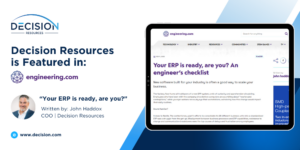Questions to Ask Your ERP Vendor Before Implementation

As with any business decision, you wouldn’t move forward without asking questions. You want to know about capabilities and compatibility, the projected impact and ROI, especially when it comes to your operations, team, processes, and products. So it stands to reason that you should find out as much as you can about a potential ERP system before taking the plunge. That’s why we’ve put together a few vital questions you should ask before you start your ERP implementation.
Once you’re ready to implement your ERP, you should have a clear understanding of a few essential components. Cost and features will be important to understand upfront, as well as how your ERP vendor will support you and your business. We also recommend asking as many questions as possible about the ERP and the implementation process. That way, you can establish a sense of confidence in your ERP and your ERP vendor, and you can ensure a smooth transition.
Consider asking the following questions to help make sure that your ERP implementation doesn’t subject you or your company to any unwanted or unwelcome surprises.
What is the timeline for implementation?
Keep in mind that a timeline shouldn’t be the same across the board. Your vendor works with multiple companies, and they will all have unique challenges and needs that affect their timeline accordingly. However, you must be on the same page as your ERP vendor. Your vendor should be able to provide you with a realistic, detailed timeline for implementation that is unique to your business.
Also, be realistic about your timeline. You may want to move through the implementation process quickly, but that may cause you to miss crucial details. At the same time, the right vendor will ensure that you get what you need without unnecessary delays.
After your ERP vendor explains the full onboarding and implementation process, ask as many questions as you need to get the reassurance that the timeline is accurate and appropriate.
How will you support us during and after implementation?
The last thing you want is a vendor who completes the implementation and then disappears. Inquire about initial and ongoing support, which might include training, testing, and maintenance. ERP systems can be complicated, especially as your company works to move all of its data and processes over. Be sure that your vendor is willing and able to offer the ongoing assistance you need before you hit ‘go.’
What is the future of your products and services?
Even if you’re happy with your ERP vendor and their proposed system, you should get to know more about their plans. This way, you can consider opportunities for your growing company. ERPs are constantly evolving. You will want evidence that your vendor’s products and services will continue to align with your company’s trajectory. There is nothing wrong with switching vendors in the future– but working with a company that can and will grow with you will save time, money, and effort in the long run.
We’re standing by to answer any questions you have about ERPs at any stage of your journey. For more advice or information, or to get started with a robust, future-proof ERP, please contact us today!
Similar Blogs

How Steel Manufacturers Forge Ahead with Infor CloudSuite Industrial ERP

Using Cloud ERP to Navigate Economic Uncertainty in The Discrete Manufacturing Sector





